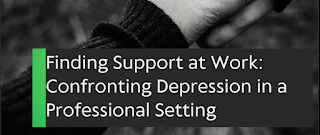My Second Challenge - Finding Support and Understanding at Work: Confronting Depression in a Professional Setting
2/4/20253 min read


As someone living with depression, I knew I couldn't hide it from my coworkers - the impact on my work would be too great. So I decided to be upfront about my mental health struggles, despite my fears of judgment and stigma.
Depression affects approximately 280 million people worldwide, which is about 3.8% of the global population (WHO, 2021).Today, depression is the second cause of DALYs in the age category 15-44 years.
I was doing my postgraduation in OBGY in DHW Akola at that time. And as any doctor can relate residency is a hard phase of oue lives.
I wanted my colleagues to understand that my depression is medical condition, just like other illness, and that I needed their support to manage it effectively, just like I would need their support if I got a bone fracture.
Sharing my diagnosis with my co-workers ended up being a pivotal decision that saved me from giving up my postgraduate education. Depression had made me feel so worthless and hopeless that I knew I couldn't get through it alone in such demanding work environment.
My co-workers were understanding and adjusted my responsibilities. Sharing with them wasn't easy due to stigma. I felt ashamed, but I knew being doctor some of them will definetly understand.
To my relief, about 80% of my colleagues were supportive and accommodating. They checked on me regularly and even stayed with me when I reached out at night, providing the care and understanding I desperately needed.
I've been fortunate to have co-workers, seniors, and juniors who understood my depression. Most of the hospital staff took it on themselves that they will help me get to other side. It was emotional to see such strong support from them.
Here, special thanks to Dr. Arati Kulwal and Dr. Vandana Mam, who were my mentors. When I wanted to give up my postgraduation they said, "Everyone thinks of giving up in residency, and in addition you are depressed. So, first get treatment and once you get better then we will visit the discussion. But we strongly suggest you not to give up."
Dr. Deepak, who was my consultant took duties with me when I was at lowest. He used to tell me that "If you want to sleep or cry or feel like doing nothing, just say word, I will manage everthing." He was my strongest pillar and main person helped me get out of my depression.
I wish everyone gets such support from workplace, then some suicide from depression among residents will certainly reduce.
Not all was sunshine, not all of my colleagues were as understanding. Some outright dismissed my depression, claiming I was overreacting, gaining attention , dramatising or making excuses from work. I felt sick sometimes. Others even warned each-others to stay away from me, labeling me as "mentally unstable." These hurtful reactions were a painful reminder of the pervasive stigma surrounding mental illness in the workplace. It was clear they lacked any understanding of the biological basis of depression as a real, physiological condition.
Their dismissive and hurtful reactions only compounded the feelings of shame and worthlessness that my depression had already instilled in me. I wish those colleagues could have comprehended the immense struggle I was facing and the courage it took to be so vulnerable and open with them.
But I kept talking about it . By educating my colleagues about the medical nature of depression - that it is a physiological condition caused by a serotonin hormone imbalance, just like diabetes is caused by an insulin defect - I hoped to break down the harmful misconceptions that fueled the stigma. Depression is not simply a matter of "feeling sad" or "overreacting." It is a very real and debilitating illness.
In fact, when I began discussing my depression openly, many of my colleagues confided that they too had struggled with mental health issues, but were too afraid to seek help due to the stigma. This silence and shame surrounding mental illness is all too prevalent in the workplace. By sharing my own story, I hope to inspire others to be more open and to seek the support they need.
Ultimately, sharing my diagnosis with my coworkers saved me from the isolation and despair of depression. While it was a difficult and vulnerable step, the support of my understanding colleagues was instrumental in my recovery.
By opening up, I found the community I needed to fight this battle.
I am living with depression, and I know I will have to fight it daily. But I don't have to be alone, with the support of people in my life, I know depression won't win.
This is a battle I am determined to overcome.Blog post description.
